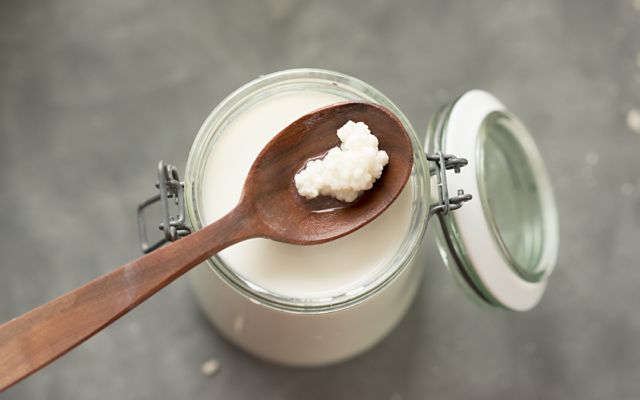Why I Love Kefir: My road to health and gut healing
Fermented foods are a big part of my diet and my family’s diet. As someone who has undergone two life saving bowel operations, diagnosed with coeliac disease and suffered with past parasitic infections fermented foods and other nutritional interventions have been crucial in healing my gut and restoring my health. I now experience true health and healing and it is for this reason I am so passionate about the role of food in restoring health and vitality. Healing the gut is the first crucial step towards long term health and healthy ageing. This is particularly true when it comes to children. One of my boys Isaac has a rare autoimmune disease which we have completely resolved through dietary changes and the use of fermented foods in his diet has been important for his healing. If you want to make a real difference to your health then start by including fermented foods daily.
Traditional cultures have used fermented foods for centuries to improve overall health. Now their use is becoming more and more popular in Western diets as a means of improving digestive health and immune function. In addition scientific research is now supporting their therapeutic benefits.
One of the most researched is Kefir. Kefir is enjoyed by many different cultures worldwide. It can be made from the cows, goat or sheep’s milk. You can also make it dairy free using coconut or nut milks.
It is slightly sour and fizzy taste due to the fermentation activity of the colonies of bacteria and yeast that make up the “grains” (kefir starter) used to culture the milk. These are not actually grains – it’s more of a grain like structure that supports the microbes. The lactic acid produced by the bacteria present contributes to its sour taste. During the fermentation process the beneficial bacteria and yeasts consume much of the lactose – the milk sugar present in dairy. Once fermented, kefir is actually very low in lactose meaning it is often tolerated by people who are lactose intolerant or find it difficult to break down lactose.
What makes kefir particularly beneficial to health is the presence of an array of beneficial bacteria and yeasts. Milk kefir is also a good source of protein and amino acids that can support gut health. As the proteins are pre-digested it can be useful for anyone with a compromised digestion. It is also rich in various B vitamins, calcium, magnesium, phosphorous and vitamin K2 making it highly valuable for bone support. In fact vitamin K2 is particularly valuable for health and something I talk a lot about in my book Eat to Get Younger. Vitamin K2 plays a key role in calcium metabolism, helping to support healthy bones and teeth, and prevent it from depositing in the arteries which can contribute to heart disease.
Digestive Health
For anyone with digestive problems it is worth considering kefir. Not only can it help to reinoculate the gut but there are various studies to support its anti-microbial and anti-fungal properties. Studies have found that kefir can inhibit the growth of dangerous bacteria like Salmonella and Escherichia coli. Kefir can also help to control Candida overgrowth. Other studies show that the good bacteria found specifically in kefir may reduce the effects of toxins released by Clostridium difficile. Beneficial bacteria also support the production of short chain fatty acids, like butyric acid known for their anti-inflammatory properties and are particularly helpful in nourishing the colon.
Anti-inflammatory Action
The bacteria in kefir produce a structural sugar called kefiran. Studies have suggested it can exert many health-promoting effects including immune modulation, lowering high blood pressure and reducing high cholesterol. This makes it beneficial for heart health.
As it can modulate the immune system it is helpful in lowering inflammation and reducing allergic responses. The beneficial yeast in kefir—like Kluyveromyces marxianus and Saccaromyces reduce inflammation in the intestinal tract. Studies suggest that kefir may help treat colitis. If you suffer with allergies then consider including kefir regularly. One study found that kefiran may reduce allergic inflammation by suppressing mast cell degranulation and cytokine production. Other studies confirm its ability to lower general allergic responses.
Skin Health
By modulating inflammation and supporting a healthy gut flora there is good reason to use kefir for skin conditions. When applied topically, kefir extracts have been shown to possess antimicrobial and anti-inflammatory properties and result in improved wound healing.
Anti-Cancer Action
Research has also demonstrated that kefir may have an anti-tumour effect. In one study, kefir inhibited tumour growth and induced apoptosis making it potentially beneficial in reducing the risk of cancer. Another study suggested that kefir may reduce the risk of colorectal cancer. While a separate study found that kefir may be reduce the risk of stomach cancer.
Making Your Own Kefir
It is easy to make your own kefir at home. The key is to use the best quality milk – organic full fat milk is important or if you have access to raw organic dairy you may wish to use this. If you cannot tolerate dairy you can make kefir with coconut milk. You can also use water kefir grains to make water or coconut water kefir.
In addition to simply drinking it you can use it to make superfood smoothies, raw dressings, dips and sauces. Do not heat it, as you will destroy the beneficial bacteria.
If you don’t fancy making your own there are some excellent kefir brands available – here are may favourites for coconut kefir and milk kefir. If you want to know how to make your own fermented foods why not book onto one of my fermented food workshops. Your body will thank you for it.

